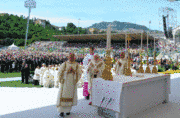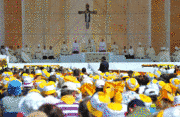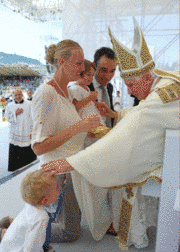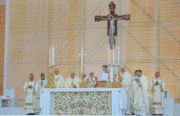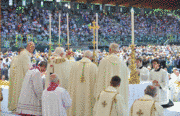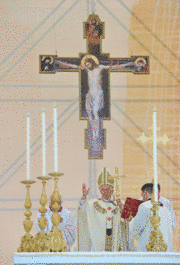Solemnity of the Most Holy Trinity 2011
Papa Benedetto was on pilgrimage in San Marino, on his 20th apostolic voyage.
Pope Benedict XVI's homily at Holy Mass in San Marino
Trinity Sunday, 19 June 2011, Olympic stadium of Serravalle - also in French, German, Italian, Portuguese & Spanish
"Dear Brothers and Sisters,
Great is my joy in being able to break with you the bread of the Word of God and of the Eucharist and to address to you, dear people of San Marino, my most cordial greeting. My special thoughts go to the Captains Regent and to the other political and civil authorities present at this Eucharistic celebration. I greet with affection your pastor, Bishop Luigi Negri, whom I thank for his courteous words and, with him, I greet all the priests and faithful of the diocese of San Marino-Montefeltro; I greet each one of you and express my heartfelt gratitude for the cordiality and affection with which you have welcomed me. I have come to share with you the joys and hopes, efforts and duties, ideals and aspirations of this diocesan community. I know that you are not without difficulties, problems and concerns here. I want to assure you all that I am close to you and remember you in prayer, and I encourage you to persevere in bearing witness to the human and Christian values that are so deeply rooted in the faith and history of this territory and its people, with its granitic faith of which the Bishop spoke.
Today we are celebrating the Feast of the Blessed Trinity, the Feast of God, of the centre of our faith: God the Father, Son and Holy Spirit. When one thinks of the Trinity, one usually thinks of the aspect of the mystery: they are Three and they are One, one God in three Persons. Actually God in his greatness cannot be anything but a mystery for us, yet He revealed himself. We can know him in his Son and thus also know the Father and the Holy Spirit. Instead today’s Liturgy draws our attention not so much to this mystery as to the reality of love that is contained in this first and supreme mystery of our faith. The Father, the Son and the Holy Spirit are one because God is love and love is an absolute life-giving force; the unity created by love is a unity greater than a purely physical unity. The Father gives everything to the Son; the Son receives everything from the Father with gratitude; and the Holy Spirit is the fruit of this mutual love of the Father and the Son. The texts of today’s Mass speak of God and thus speak of love; they do not dwell so much on the three Persons, but rather on love which is the substance and, at the same time, the unity and trinity.
The first passage that we heard, taken from the Book of Exodus and which I dwelt on at a recent Wednesday catechesis, is surprising because the revelation of God’s love comes after a very serious sin of the people. They had hardly concluded the oath of the Covenant which they took at Mount Sinai, and already the people were disloyal. In Moses’ prolonged absence, the people said: “But where has this Moses gone, where is his God?” and they asked Aaron to create a god who would be visible, accessible and controllable, within the reach of man instead of this mysterious, invisible and distant God. Aaron complied and made a golden calf. Coming down from Sinai, Moses saw what had happened and broke the tablets of the Covenant which was already broken, shattered, two stones on which were written the “Ten Words”, the concrete contents of the agreement with God. It looked as if all was lost, the friendship, immediately and from the outset, was broken. Yet, despite this most grievous sin of the people, through Moses’ intercession God chose to forgive them and invited Moses to climb the mountain once again to receive anew his law, the Ten Commandments, and to renew the pact. Moses then asked God to reveal himself, to allow him to see his face. However, God did not show his face, but rather revealed his being, full of goodness, with these words: “The Lord, the Lord, God merciful and gracious, slow to anger, abounding in steadfast love and faithfulness” (Ex 34, 8). This is the Face of God. This self-definition of God expresses his merciful love: a love that triumphs over sin, covers it, eliminates it. We can always be sure of this goodness which does not abandon us. There can be no clearer revelation. We have a God who refuses to destroy sinners and wants to show his love in an even more profound and surprising way to sinners themselves, in order to always offer them the possibility of conversion and forgiveness.
The Gospel completes this revelation, we heard in the First Reading, because it indicates the point to which God has shown his mercy. John the Evangelist refers to these words of Jesus: “For God so loved the world that he gave his only Son, so that whoever believes in him should not perish but have eternal life” (Jn 3, 16). In the world there is evil, there is selfishness, there is wickedness, and God could come to judge this world, to destroy evil, to punish those who work in darkness. Instead, He shows his love for the world, his love for man, despite his sin, and sends what is most precious: his Only-Begotten Son. And not only does God send Him, but He gives Him as a gift to the world. Jesus is the Son of God who was born for us, who lived for us, who healed the sick, forgave sins and welcomed everyone. Responding to the love that comes from the Father, the Son gave his own life for us: on the cross God’s merciful love reaches its highest expression. And it is on the cross that the Son of God obtains for us participation in eternal life that is communicated to us with the gift of the Holy Spirit. Thus, in the mystery of the cross, the three divine Persons are present: the Father, who gives his Only-Begotten Son for the salvation of the world; the Son, who totally fulfils the Father’s plan; the Holy Spirit — poured out by Jesus at the moment of his death — who comes to make us participants in divine life, to transform our existence so that it may be enlivened by divine love.
Dear brothers and sisters, faith in the Trinitarian God has characterized this Church of San Marino-Montefeltro, too, throughout the course of its ancient and glorious history. The evangelization of this land is attributed to the holy stonemasons Marinus and Leo who are said to have come to Rimini from Dalmatia in the middle of the 3rd century. Because of the holiness of their lives they were ordained, respectively a priest and a deacon, by Bishop Gaudentius who sent them inland, one to Monte Feretro, later known as San Leo, and the other to Monte Titano, later known as San Marino. Over and above the historical issues — which it is not our task to examine — it is interesting to state that Marinus and Leo brought into the context of this local reality, with the faith in God revealed in Jesus Christ, new perspectives and values, determining the birth of a culture and a civilization centred on the human person, the image of God and therefore the bearer of rights that precede all human legislation. The variety of ethnic groups — Romans, Goths and later Lombards — who came into contact with each other, sometimes in very conflictual situations, found in their common reference to faith a powerful factor for ethical, cultural, social and, in a certain way, political, edification. It was obvious to them that they could not consider a project of civilization complete until all the members of the people had become a living and well-structured Christian community built on faith in the Trinitarian God. Therefore one can rightly say that the wealth of this people, your wealth, dear Sammarinesi, has been and still is faith, and that this faith has created a truly unique civilization. Alongside your faith, we must also recall your absolute fidelity to the Bishop of Rome, whom this Church has always viewed with devotion and affection; likewise the attention shown to the great tradition of the Eastern Church and a deep devotion to the Virgin Mary.
You are justly proud of and grateful for all that the Holy Spirit has done in your Church throughout the centuries. However, you also know that the best way to appreciate an inheritance is to cultivate and enrich it. You are called, in fact, to develop this precious deposit in one of the most crucial moments in history. Today your mission is facing profound and rapid cultural, social, economic and political transformations that have determined new directions and changed mentalities, customs and sensitivities. Here too, as elsewhere, there is no lack of difficulties and obstacles, due above all to hedonistic models that obscure minds and risk uprooting all morality. The temptation has crept in to believe that man’s true wealth is not faith, but personal and social power, his intellect, his culture and his capacity to manipulate scientific, technological and social reality. Thus, in these lands too, people have begun to replace faith and Christian values with presumed riches which ultimately prove to be inconsistent and unable to sustain the great promise of the true, the good, the beautiful and the just that for centuries your ancestors have identified with the experience of faith. Nor should we forget the crisis into which many families have been plunged, aggravated by the widespread psychological and spiritual fragility of couples, as well as the struggle experienced by many educators in offering formative continuity to young people, who are conditioned by various types of instability, and in the first place that of their social role and work opportunities.
Dear friends, I am well acquainted with the committed involvement of every member of this particular Church in fostering the various aspects of Christian life. I urge all the faithful to be like leaven in the world, showing that in both Montefeltro and San Marino there are enterprising and consistent Christians present. May priests and religious live in an ever more cordial and active ecclesial communion, helping and listening to the diocesan pastor. May you too feel the urgent need for a resurgence in priestly vocations and to those of special consecration: I appeal to families and to young people to open their hearts to a prompt response to the Lord’s call. No one ever regrets being generous to God! I urge you lay people to be actively involved in the community so that, in addition to your specific civic, political, social and cultural tasks, you may find the time and inclination for a life of faith, for pastoral life. Dear people of San Marino, stay firmly faithful to the heritage built over the centuries under the inspiration of your great patrons, Marinus and Leo. I invoke God’s blessing on your journey, today and in the future, and I commend you all to “the grace of the Lord Jesus Christ and the love of God and the fellowship of the Holy Spirit” (2 Cor 13, 14). Amen!"
Papa Benedetto's words at the Angelus:
- in Croatian, English, French, German, Italian, Portuguese & Spanish
"Dear Brothers and Sisters, While we are preparing to conclude our celebration the midday hour invites us to turn in prayer to the Virgin Mary. In this region too Our Most Holy Mother is venerated in various shrines, both old and new. To her I entrust all of you and the entire population of San Marino and Montefeltro and, in particular, those who are suffering in body and mind. I address a special thought of gratitude at this time to all who cooperated in the preparation and organization of this visit. My heartfelt thanks!
I am pleased to recall that Bl. Sr Marguerite Rutan, a Daughter of Charity, is being beatified today in Dax, France. In the second half of the 18th century she worked with deep dedication at the Hospital in Dax but in the tragic persecutions that followed the Revolution she was sentenced to death for her Catholic faith and her fidelity to the Church.
I am participating in spirit in the joy of the Daughters of Charity and of all the faithful in Dax who are taking part in the beatification of Sr Marguerite Rutan, a shining witness of Christ’s love for the poor.
Lastly, I would like to recall that tomorrow is the World Refugee Day. On this occasion, this year we are celebrating the 60th anniversary of the adoption of the international convention which protects all those who are persecuted and forced to flee their countries. I therefore ask the civil authorities and every person of goodwill to guarantee to refugees acceptance and dignified living conditions, while they wait to return in freedom and safety to their homeland."
Papa Benedetto's words to Young People
Piazza Vittorio Emanuele, Pennabilli - in English, French, German, Italian, Portuguese & Spanish
"Dear Young People,
I am very glad to be here among you and with you! I sense your joy and the enthusiasm that is characteristic of your age. I greet and thank your Bishop, Luigi Negri, for his cordial words of welcome, and your friend who has interpreted your thoughts and feelings and formulated several very serious and important questions. I hope that in the course of my commentary the elements for finding answers to these questions will emerge. I greet with affection the priests, sisters and counsellors who share your journey of faith and friendship; as well, of course, as your parents who are filled with joy at seeing you grow strong in goodness.
Our meeting here in Pennabilli in front of this cathedral, the heart of the diocese, and in this square, makes us think of the many different meetings of Jesus which are recounted in the Gospels. Today I would like to recall the famous episode in which as the Lord was setting out, someone — a rich young man — ran up and kneeling before him asked this question: “Good Teacher, what must I do to inherit eternal life?” (Mk 10, 17). Perhaps today we would not express ourselves this way, but the meaning of the question is exactly the same: what should I do, how should I live in order to live truly, to find life. We can therefore see in this question the broad and varied human experience that leads to the search for meaning, for the profound sense of life: how to live and why to live. Indeed, the “eternal life” to which the young man of the Gospel referred not only means life after death, he did not only want to know how to reach Heaven. He wanted to know: how must I live now in order to obtain already the life that can then also be eternal. Therefore, in this question the young man expresses his need to find meaning, fullness and truth in daily life. A person cannot live without this search for the truth about himself — who am I, what am I living for — a truth that is an incentive to widen his horizon and to go beyond material things, not in order to flee from reality but to live it in an even truer way that is richer in meaning and hope, and not merely superficial. Moreover, I think — and I have seen and heard it in your friend’s words — that this is also your experience. The important questions we bear within us remain, they always resurface. Who are we? Where do we come from? Who do we live for? These questions are the highest sign of the transcendence of the human being and of our innate capacity not to stop at appearances. And it is precisely by looking at ourselves with truth, sincerity and courage that we understand the beauty, and also the precariousness of life and feel a dissatisfaction, a restlessness, that nothing material can fill up. In the end all promises prove often inadequate.
Dear friends, I invite you to become aware of this healthy and positive restlessness and not to be afraid to ask yourselves the fundamental questions on the meaning and value of life. Do not stop at partial, immediate answers; they are certainly easier and more convenient at the time and can bring a few moments of happiness, exaltation or intoxication but they do not lead you to the true joy of living, the joy that is born, as Jesus said, from those who build on solid rock rather than on sand. Learn how to reflect, how not to interpret your human experience superficially but rather in depth: you will discover, with wonder and joy, that your heart is a window open on the infinite! This is man’s greatness but also his difficulty. One of the the illusions produced in the course of history was the belief that technical and scientific progress would be able, in an absolute manner, to provide answers and solutions to all humanity’s problems. And we see that this is not the case. In fact, even if this had been possible, nothing and no one would have been able to delete the most profound questions on the meaning of life and death, on the meaning of suffering, of all things, because these questions are written in the human spirit, in our hearts, beyond the sphere of needs. Even in the epoch of scientific and technological progress — which has given us so much — the human person remains a being who wishes for more, for something more than comfort and well-being; the human being who is open to the whole truth of his or her existence, who cannot stop at material things but opens to a far wider horizon. You experience all this continually, every time you ask yourselves: but why? When you contemplate a sunset or when a piece of music stirs your heart and mind; when you feel what it means to love truly; when you feel forcefully the sense of justice and truth, and when you feel indignant about the lack of justice, truth and happiness.
Dear young people, the human experience is a reality that we share, but it may be given various degrees of meaning. And it is here that is decided the way to direct one’s life, and here that one chooses to whom to entrust it, to whom to entrust oneself. The risk is always that of remaining confined to the world of things, of the immediate, the relative, the useful, of losing sensitivity to all that refers to our spiritual dimension. It is by no means a question of contempt for the use of reason or of rejecting scientific progress, far from it. Rather, it is a matter of understanding that each one of us is not only made in a “horizontal” dimension but also has a “vertical” dimension. Scientific data and technological instruments cannot replace the world of life, the horizons of meaning and freedom, of the richness of relationships of friendship and love.
Dear young people, it is precisely in being open to the whole truth about us, about ourselves and about the world, that we perceive God’s project for us. He meets the needs of every human being and enables us to know the mystery of his love. In the Lord Jesus who died and rose for us and gave us the Holy Spirit, we are also enabled to share in God’s own life, we belong to God’s family. In him, in Christ, you can find the answers to the questions that accompany you on your way, not superficially or easily but by walking with Jesus, by living with Jesus. The encounter with Christ is not resolved in adherence to a doctrine or a philosophy; what he proposes to you is to share in his life itself and thus to learn to live, to learn what the human being is, to learn what I am. Jesus answered the young man who asked him what he should do to have eternal life, in other words, to live truly, with an invitation to detach himself from his possessions and added, “come, follow me” (Mk 10, 21). Christ’s words show that your life finds meaning in the mystery of God who is Love; a demanding and profound Love that goes beyond superficiality! What would your life be without this love? God takes care of man from creation all the way to the end of time, when he will bring his plan of salvation to completion. In the Risen Lord we have the certainty of our hope! Christ himself, who went to the depths of death and rose, is hope in Person and the definitive Word spoken on our history, he is a positive word.
Do not be afraid to face difficult situations, moments of crisis, the trials of life, for the Lord goes with you, he is with you! I encourage you to grow in friendship with him through frequent reading of the Bible and of the whole of Sacred Scripture, through faithful participation in the Eucharist as a personal encounter with Christ, through commitment within the ecclesial community, journeying on with a good spiritual director. Transformed by the Holy Spirit, you will be able to experience authentic freedom, which is such when it is oriented to goodness. In this way your life, inspired by a continuous search for the face of the Lord and by the sincere wish to give yourselves, will be a sign for many of your peers, an eloquent appeal to ensure that the desire for fullness, which is in all of us, will be fulfilled at last in the encounter with the Lord Jesus. Let the mystery of Christ illuminate your whole self! You will then be able to bring to the different contexts that newness which can change relationships, institutions, and structures, to build a world that is fairer, that shows greater solidarity, enlivened by the search for the common good. Do not give in to an individualistic or selfish logic! May you be comforted by the witness of the many young people who reached the destination of holiness: only think of St Thérèse of the Child Jesus, of St Dominic Savio, St Maria Goretti, Bl Pier Giorgio Frassati and Bl Alberto Marvelli — from this land — and of many others, unknown to us but who lived their time in the light and power of the Gospel, and found the answer: how to live, what they must do to live.
To conclude this meeting I would like to entrust each one of you to the Virgin Mary, Mother of the Church. Like her, you can say and renew your “yes”, and always magnify the Lord with your life, because he gives you words of eternal life! So courage, dear young men and women, on your journey of faith and of Christian life I too am always close to you and accompany you with my Blessing. Thank you for your attention!"
Pope Benedict XVI's address to members of the Government, Congress and Diplomatic Corps:
Hall of the Great & General Council of the Public Palace - in English, French, German, Italian, Portuguese & Spanish
"Most Serene Captains Regent, Distinguished Ladies and Gentlemen,
I warmly thank you for your welcome; in particular I express my gratitude to the Captains Regent, and also for their courteous words. I greet the members of Government and of the Congress as well as the Diplomatic Corps and all the other authorities gathered here. In addressing you, I embrace in spirit the whole population of San Marino. Ever since it came into being this Republic has maintained friendly relations with the Apostolic See, which in recent times have developed and consolidated. My presence here, in the heart of this ancient Republic, expresses and confirms this friendship.
More than 17 centuries ago, a group of the faithful, won over to the Gospel by the preaching of the Deacon Marinus with his witness of holiness, gathered round him to give life to a new community. Taking up this precious heritage, the Sammarinesi have always been faithful to the values of the Christian faith, in which they firmly anchored their own peaceful coexistence, in accordance with criteria of democracy and solidarity.
Aware of these Christian roots, your ancestors were able to bring to fruition down the centuries the great moral and cultural patrimony that they in turn had received, giving life to a hard-working, free people who, even in this tiny territory, did not fail to make a specific contribution to the neighbouring peoples of the Italian peninsula and to the whole world of civilization, marked by peaceful coexistence and mutual respect.
In addressing you today, I rejoice in your attachment to this patrimony of values and urge you to preserve it and make the most of it, since it is at the root of your deepest identity, which requires to be assumed fully by the people and institutions of San Marino. This identity makes it possible to build a society attentive to the true good of the human person, of human dignity and freedom, and that can safeguard the right of every people to live in peace. These are the strong points of healthy secularism within which the civil institutions must act in their constant commitment to defending the common good. The Church, respecting the legitimate autonomy which the civil authority must enjoy, collaborates with it at the service of man, to defend his fundamental rights, those ethical requirements that are engraved in human nature itself.
For this reason the Church strives to ensure that civil legislation always promotes and protects human life, from conception until its natural end. She also asks for due recognition of the family, as well as effective support. In fact, we know well that in the present context the family institution is being called into question, as if in the attempt to ignore its inalienable value. Those that suffer the consequences are the weakest social categories, especially the young generations that are more vulnerable and so more easily exposed to disorientation, situations of self-marginalization and the slavery of dependence. It is sometimes difficult for educational institutes to provide youth with adequate responses and when family support is lacking they often find natural insertion into the social fabric difficult. For this reason too it is important to recognize that the family, as God made it, is the milieu that best encourages harmonious growth and helps free and responsible individuals to develop, trained in the deep and enduring values.
In the difficult economic situation that the Community of San Marino must also reckon with in the Italian and international context, I would like to give you a word of encouragement. We know that the years that followed the Second World War were a time of straitened economic circumstances that forced thousands of your fellow citizens to emigrate. Then came a period of prosperity, in the wake of the development of trade and tourism, especially in the summer because of the closeness to the Adriatic coast. Such periods of relative prosperity often bring a certain impoverishment in the Christian meaning of life and in fundamental values. Nevertheless San Marino’s society still manifests its wholesome vitality and has retained the best of its energy. Proof of this is the range of charitable and volunteer projects to which many of your fellow-citizens are dedicated.
I would like here also to recall the numerous missionaries of San Marino, lay people and religious, who in recent decades left this land to take Christ’s Gospel to various parts of the world. Hence positive forces are not lacking that will permit your community to face and to get the better of the present difficult situation. In this regard, I hope it will be possible to resolve the issue of border-workers who see their employment threatened, taking into account the right to work and the protection of families.
In the Republic of San Marino, the current crisis is an incentive to re-programme the way to proceed and is an opportunity for discernment (cf Encyclical Caritas in Veritate, 21). Indeed, it confronts the entire social fabric with the impelling need to face problems with courage and a sense of responsibility, with generosity and dedication, with reference to that love of freedom which distinguishes your people. In this regard, I would like to repeat to you the words Bl. John XXIII addressed to the Regents of the Republic of San Marino during an official visit they made to the Holy See: “The love of freedom”, Pope John said, “boasts among you exquisitely Christian roots, and your forefathers, understanding their true meaning, taught you never to disassociate its name from God’s, which is its irreplaceable foundation” (Discorsi, Messaggi, Colloqui del Santo Padre Giovanni XXIII, I, 341-343: AAS 60 [1959], 423-424). Still today the great Pope’s recommendation has kept its imperishable value: freedom, that institutions are called to promote and defend in society, indicate a greater and more profound one, that freedom enlivened by the Spirit of God whose life-giving presence in our heart gives the will the ability to orient itself and opt for goodness. As the Apostle Paul said: “God is at work in you, both to will and to work for his good pleasure” (Phil 2, 13). St Augustine, commenting on this passage, emphasized: “It is certain that it is we that will when we will, but it is he who makes us will what is good”, it is God, and St Augustine adds: “The steps of a man are ordered by the Lord, and his way does he will” (On Grace and Free Will, 16, 32).
It is therefore your task, distinguished ladies and gentlemen, to build the earthly city with the proper autonomy and respect for the human and spiritual principles to which every individual is called to adhere with a fully responsible conscience, and, at the same time, it is your duty to continue working actively to build a community founded on shared values. Most Serene Captains Regent and distinguished authorities of the Republic of San Marino, I wholeheartedly express the hope that the whole of your community, in sharing the civil values and with your specific cultural and religious features, may write a new and noble page of history and become, increasingly, a land in which solidarity and peace thrive. With these sentiments I entrust this beloved people to the maternal intercession of Our Lady of Grace and I warmly invoke upon each and every one the Apostolic Blessing."
